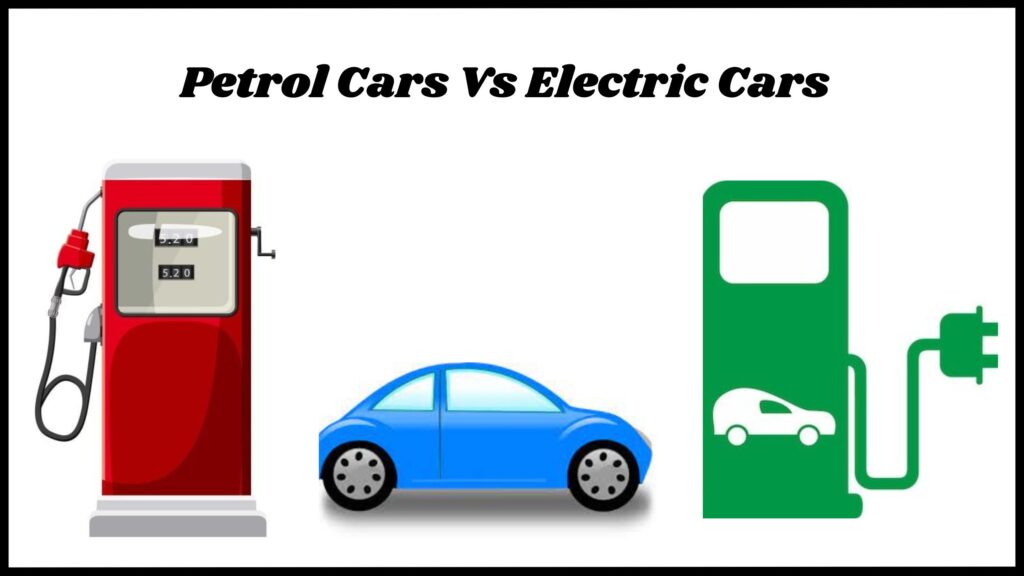Introduction
With the introduction of Electric Cars vs Petrol Cars (vehicles), the automobile industry has recently undergone a dramatic change. These environmentally friendly cars have generated a debatable discussion that puts them against their venerable petrol rivals. As worries about the future of the environment and energy efficiency increase, there is an increase in competition between electric and petrol-powered cars. To assist you in choosing the kind of car that best suits your values and way of life, we’ll look more closely at both options’ positive and negative aspects in this article. We hope that readers of this site can discover the solution to their query of “Electric Cars vs Petrol Cars”
Table of Contents
Definition of Electric Vehicles
“Electric vehicles” or EVs for short, are a modern and eco-friendly means of transportation that run on electricity rather than more conventional fuels like petrol or diesel. EVs have an electric motor and a sizable battery instead of an internal combustion engine that relies on burning petroleum or diesel. The electric motor uses the battery’s energy to drive the wheels as the vehicle moves forward by converting it into power.
Definition of Petrol/Diesel Vehicle
Petrol vehicles use petrol, whereas diesel vehicles use diesel fuel when you fill up their tanks at the gas station. The fuel (petrol/diesel) is subsequently ignited by the engine inside the combustion chamber (ICE), resulting in little explosions that generate the energy required to turn the wheels and carry the vehicle ahead.

Electric Cars Vs Petrol Cars (Comparison)
1. Effect On The Environment
Electric Cars (EVs): The electricity that powers electric vehicles (EVs) is often sourced from the grid or clean energy sources like solar and wind. They are substantially cleaner and more environmentally friendly because they have no tailpipe emissions. By opting for an electric vehicle, you help to lessen air pollution and the release of greenhouse gases, which helps to fight climate change and promote better air quality.
Petrol Cars: In contrast, internal combustion engines found in petrol/diesel-powered vehicles burn fossil fuels like fuel, releasing dangerous pollutants like carbon dioxide into the environment. These gases harm the environment and our health while also increasing global warming.
2. Energy Effectiveness
Electric Cars: When compared to petrol/diesel powered vehicles, electric vehicles use less energy. They lose less energy because they use more of the energy from the power source to drive the wheels. Lower operating expenses and maybe less overall energy use result from this efficiency.
Petrol/Diesel Cars: Despite gaining efficiency over time, petrol/diesel cars still suffer from natural losses because of the design of their engines. Due to the less efficient combustion of petrol/diesel compared to the usage of electricity to drive an electric motor, petrol cars require more energy to cover the same distance.
3. Car Range/Mileage
Electric Cars: Electric Cars range (mileage) and charging facilities have been two major points of worry for owners of electric cars. But as battery technology has advanced, the driving range of electric cars has significantly increased, with several models now capable of hundreds of miles of range on a single charge. Additionally, the infrastructure for charging is growing quickly, making it easier to access charging stations in cities and on highways.
Petrol Cars: Petrol vehicles benefit from established refilling infrastructure. There are many petrol pumps, and filling the tank just takes a few minutes, making it convenient for long journeys and those without access to charging stations.
4. The Cost Factors
Electric Cars: Because of the expensive battery technology, electric cars may have a larger early investment. However, over time, they may end up saving you money. Because electricity is typically less expensive than fuel, running costs are reduced. In addition, governments regularly offer rebates and incentives to promote the use of electric vehicles, regularly reducing the financial burden. Check latest on road prices of all electric vehicles.
Petrol Cars: Although they frequently cost less up front, the cost of fuel and regular servicing can make them more expensive to operate. Check latest on road prices of all petrol vehicles
5. Refueling/Charging Time
Electric Cars: Charging times can vary, however fast chargers can offer a significant charge in between 30 and 60 minutes.
Petrol Cars: Tank filling typically takes a few minutes. This is a plus point for all fuel based vehicles.

6. Registration Fees
Electric Cars: EV’s in India are not required to pay registration fees. This therefore results in huge financial savings when buying cars.
Petrol Cars: On the other hand, while purchasing a petrol/diesel car, you must pay registration fees. The registration cost varies based on the cost of the vehicle.
7. Car Insurance
Electric Cars: Insuring an electric car will be very expensive. A battery pack, electric motor, and other expensive parts are included in an EV. As a result, insurance is more expensive.
Petrol Cars: In comparison to an EV, the cost of car insurance is cheaper for petrol/diesel-powered cars.
8. Gearbox Option
Electric Cars: All electric cars comes with an automatic gearbox as standard. Cars with automatic gearbox are easy for driving, specially for new and female drivers.
Petrol Cars: People who like manual gearbox will prefer petrol and diesel cars because most petrol and diesel cars models comes with both automatic and manual gearbox options.
5 Years Ownership Cost Comparison
1. Electric Car
| Item | 1st Year | 2nd Year | 3rd Year | 4th Year | 5th Year | Total Cost of 5 Years |
| Insurance Cost | 65,000/- | 62,000/- | 57,000/- | 53,000/- | 48,000/- | 2,20,000/- |
| Maintenance Cost | 3,000/- | 5,000/- | 6,000/- | 8,000/- | 8,000/- | 30,000/- |
| Charging Cost | 4,500/- | 4,500/- | 4,500/- | 4,500/- | 4,500/- | 22,500/- |
| Total Cost | 72,500/- | 71,500/- | 67,500/- | 65,500/- | 65,500/- | 2,72,500/- |
2. Petrol Car
| Item | 1st Year | 2nd Year | 3rd Year | 4th Year | 5th Year | Total Cost of 5 Years |
| Insurance Cost | 40,000/- | 36,000/- | 32,000/- | 28,000/- | 25,000/- | 1,21,000/- |
| Maintenance Cost | 9,000/- | 10,000/- | 12,000/- | 14,000/- | 16,000/- | 61,000/- |
| Fuel Cost | 59,000/- | 59,600/- | 60,200/- | 60,800/- | 61,400/- | 3,01,000/- |
| Total Cost | 1,08,000/- | 1,05,600/- | 1,04,200/- | 1,02,800/- | 1,02,400/- | 2,72,500/- |
Conclusion
Although The choice between electric and petrol-powered cars comes based on priorities. When it comes to environmental responsibility, energy efficiency, and long-term cost savings, electric automobiles stand out. For those who care about the environment and have access to charging stations, they are a fantastic option.
For people who require longer driving distances or live in places with limited infrastructure for charging, however, petrol/diesel-powered vehicles might still be a better option. However, it’s critical to take note of how fuel-powered cars affect the environment and contribute to climate change.
Ultimately, both technologies will continue to develop and we may anticipate even more environmentally and energy-conscious choices in the future. Whatever decision you make, keep in mind that every step taken in the direction of adopting cleaner modes of transportation contributes to a better, more sustainable future for everyone.

